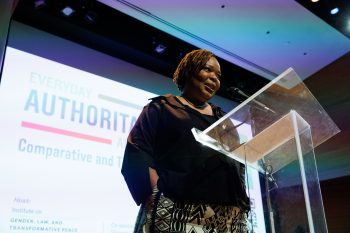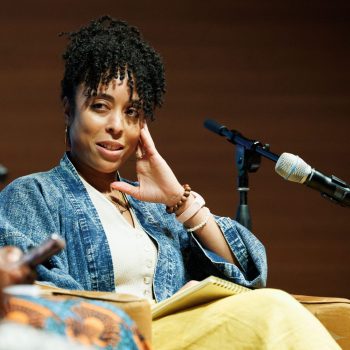Coinciding with UNGA 2025, the Event Featured Prominent Nobel Peace Laureates, Global Thought Leaders, and Renowned Scholars
By Institute Staff
8 October 2025
Coinciding with the United Nations General Assembly this September, the Institute on Gender, Law, and Transformative Peace at the City University of New York hosted a global convening Everyday Authoritarianism and Human Rights: Comparative and Transnational Lessons. Co-sponsored by Nobel Women’s Initiative and Gbowee Peace Foundation, Africa-USA, the event brought together Nobel Prize laureates, renowned scholars, movement leaders, journalists and international thought leaders to address the urgent challenges of rising authoritarianism, disinformation, and threats to democracy globally.
The day featured an extraordinary line-up including Nobel Peace Laureates Leymah Gbowee (Executive Director, Institute on Gender, Law, and Transformative Peace), Maria Ressa (Co-Founder and CEO of Rappler), and Tawakkol Karman (Founder and President, Women Journalists Without Chains), alongside Nobel Economics Laureate Joseph Stiglitz, movement leaders, journalists, scholars, and funders from across the world.

Nobel Peace Laureate Leymah Gbowee, Executive Director of the Institute on Gender, Law and Transformative Peace at the City University of New York, welcomed participants to the urgent and timely conversation on fighting authoritarianism across the globe.
Photo Credit: Sirin Samman
Opening the event, Institute Executive Director Leymah Gbowee recalled the power of community in the Liberian struggle for freedom. “It was in a small community in Liberia where I grew up that I learned what collective humanity was, where one person’s problem was everyone’s problem,” she said. “Can we see the same in our world today? Fear has taken over fortitude. Terror has taken over transparency. Hate has taken over harmony. I am of the conviction that each and every one of us in this room carries a light. We are coming together today as a group of individuals to say, how are we transforming the world? And my hope is that you’ll leave here renewed, revived, and that the sense of fear that so many people are carrying will be transformed.”
Speakers explored timely and urgent questions about human rights and democracy, drawing on their history and experiences fighting authoritarianism in different parts of the world. The event, held during the 80th meeting of the United Nations General Assembly, was designed to center perspectives from those who lived through authoritarian rule and conflict across the globe, particularly from the Global South, alongside frontline democratic movement organizers in the United States. The convening showcased thought leaders working at the intersections of pro-democracy movements, climate, and racial and gender justice and the strategies and solidarities they believe are critical in this political and historical moment.
Panels Spotlight Global Challenges and Comparative Perspectives

Nobel Peace Laureate Tawakkol Karman reflected on the role of the academy in upholding freedom of expression on a panel with MacArthur Fellow Cristina Jiménez Moreta, Co-Founder of United We Dream, and movement strategist Yelena Litvinov of STROIKA, Inc., moderated by Nermeen Shaikh, Journalist and Co-host of Democracy Now.
Photo Credit: Sirin Samman
The day-long program was organized around three major themes, each exploring an aspect of how authoritarianism encroaches on the everyday life of democracies. The first panel, Lessons from Frontline Activists and in the Face of Repression, examined how frontline activists and journalists are fighting back against misinformation, repression, and violence amid rollbacks of gender, reproductive, and political rights. Speakers included MacArthur Fellow Cristina Jiménez Moreta, Co-Founder of United We Dream; Yelena Litvinov, Co-Founder of the anti-authoritarian movement building organization STROIKA, Inc, and Nobel Peace Laureate Tawakkol Karman, Founder and President of Women Journalists Without Chains. The panel was moderated by Nermeen Shaikh, Journalist and Co-host of Democracy Now. Audience conversation opened with remarks from Cathy Albisa, Co-Executive Director, Branch4.
The panelists’ exchange set the stage for the day’s conversations about movement-building and cross-mobilization, with examples, strategies, and practices for solidarity that movements can employ against threats to freedom of the press and targeting of universities and NGOs by authoritarian leaders. They urged the audience to not back down or freeze in the face of threats, and instead to maintain the pressure through protest and joining together.

The convening represented a rare assembly of perspectives across sectors, movements, and geographies.
Photo credit: Sirin Samman
Yelena Litvinov observed: “We know an attack on one is an attack on everyone—we know all the catchphrases—but there’s a real action and agency that solidarity requires. It requires not shying away from the fear and the grief. We should feel the grief and let it compel us into action: to stand up for each other, to stand up for our communities, to keep pushing back and saying that a better world is possible. To show that we can come together across all these divisions that authoritarians want to put upon us in order to create that better world.”
The second panel, The Revolution Will Not Be Funded’: Lessons from Crisis Funding Contexts explored the critical question of how to sustain movements during times of funding uncertainty, focusing on resourcing strategies and new coalition-building approaches. Fadekemi Akinfaderin, Chief Global Advocacy Officer of Fòs Feminista moderated the panel, which included Institute Executive Director Leymah Gbowee, Cynthia Eyakuze, Co-Vice President of the Global Program at the Equality Fund and Tynesha McHarris, co-founder of The Black Feminist Fund. Dierdre Williams, Managing Director of Network Grants, Open Society Foundations offered reflections as the audience respondent.
The panel examined the upheaval stemming from a crisis of funding for frontline organizing amid authoritarianism. Reflecting on the opportunities of this moment, Tynesha

Tynesha McHarris, co-founder of The Black Feminist Fund.
Photo Credit: Sirin Samman
McHarris shared: “As funders, I think we’re in a moment where we get to be subversive in order to make good on the promise of the work we want to do, which is freedom for all. We get to figure out ways to get resources out for the movements that are working to advance justice so there isn’t a need for philanthropy in the first place.”
The third panel, How to #HoldTheLine in the Age of Exponential Lies, looked at the role of disinformation in advancing authoritarian rule and strategies to combat it. The panel was moderated by Aidan Eyakuze, Chief Executive Officer of Open Government Partnership, who opened the conversation by noting: “Authoritarian leaders have always wielded falsehoods as weapons. What is new is the scale and speed. Lies now travel faster than truth, amplified by technology, monetized by platforms, and weaponized against citizens and democracies. From Manila to Minneapolis, from Dar es Salaam, to Delhi, we see the same playbook. Disinformation fuels division, corrodes trust, and weakens the very institutions meant to protect rights. It silences critics, confuses citizens, and creates fertile ground for repression.”

Nobel Economics Laureate, Dr. Joseph Stiglitz, Columbia University and Dr. Jothie Rajah, Research Professor, American Bar Foundation participating in a discussion of fighting the role of disinformation in advancing authoritarian rule. Photo credit: Milik Robinson
Eyakuze was joined on the panel by Nobel Peace Laureate Maria Ressa, Co-Founder and CEO of Rappler, Dr. Jothie Rajah, Research Professor, American Bar Foundation, and Nobel Economics Laureate Dr. Joseph Stiglitz, Economist and Professor, Columbia University. Audience respondent remarks were given by Fahd Ahmed, Executive Director, DRUM – Desis Rising Up & Moving of New York City.
The event concluded with a conversation between Nobel Peace Laureates Maria Ressa and Leymah Gbowee on solidarity in these times—and the critical value of privileging the voices of those who have fought authoritarianism and whose experiences are often overlooked.
Launching Stories from the Frontlines

Fahd Ahmed, Executive Director of DRUM – Desis Rising Up & Moving of New York City, delivered comments as the audience respondent on fighting disinformation.
Photo credit: Milik Robinson
The convening represented a rare assembly of voices who have fought authoritarianism across multiple continents in conversations about new strategies and solutions. Building on the exchange and connections forged at the event, the Institute is launching a cross-learning initiative on countering everyday authoritarianism. The initiative is designed to center the expertise of organizations from the Global South who have navigated these challenges, documenting and sharing their experiences, strategies, and tactics, lessons and pitfalls.
As a hub for cross-sectoral, cross-movement, and transnational organizing, research and scholarship, the Institute’s goal is to inform groups encountering these issues for the first time and assist them in building new relationships and partnerships in support of their work. Over the next year, the Institute will partner with these organizations to create accessible resources that capture their hard-won insights on resisting authoritarianism in daily life.
As Institute Managing Director Dr. Mikaela Luttrell-Rowland noted at the event, “The very act of gathering, of cultivating community, of turning to critical inquiry, is an act of resistance in today’s context, she said. “We all know the problems. Now we need to imagine solutions.”
